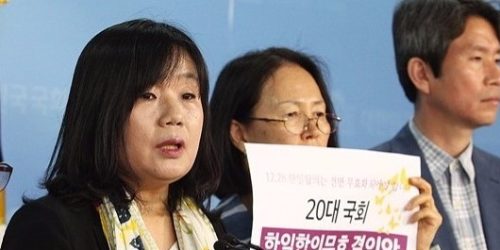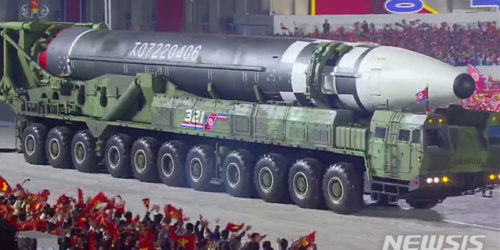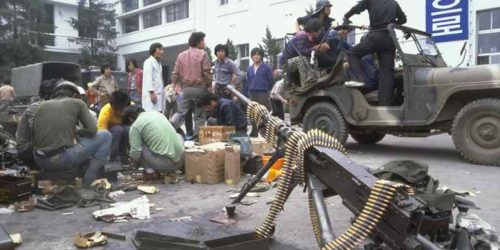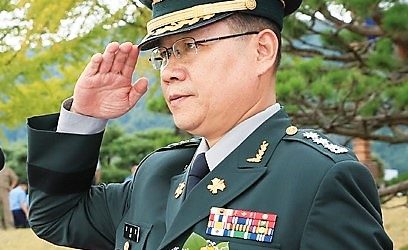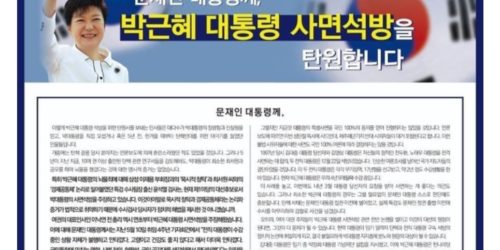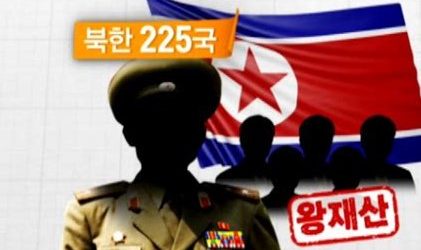Unification Minister Hearing: Thae Yong-ho Asks Lee In-young About Espousing Juche Ideology, National Security Law, Ji Seong-ho Asks about South Koreans detained in North Korea, Park Jin asks about the Alliance
2020-8-2, Tara O
Despite the disapproval from the main opposition party, President Moon Jae-in approved Lee In-young (이인영) as the Unification Minister on Monday, July 27, 2020. Lee was the former #2 person in the Anti-American Youth Association, which was the underground organization that provided leadership to Jeondaehyup, the violent, radical 1980s student organization based upon North Korea’s Juche ideology. Lee’s hearing at the National Assembly took place over two days on July 23 and July 24, 2020, just prior to the weekend. Despite the controversies that emerged during the hearing, further discussions to address those controversies as it relates to Lee’s qualification or appropriateness to be a minister did not occur prior to his appointment.
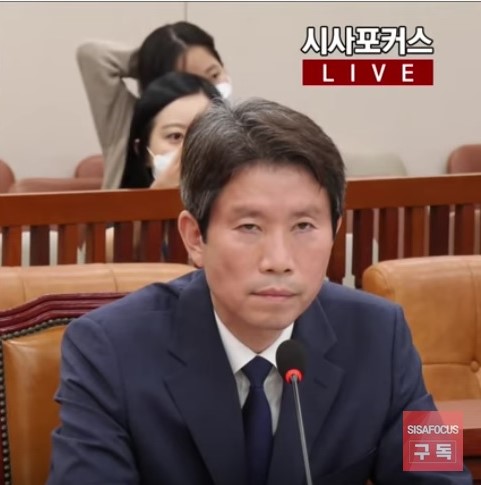
Here are some key issues that emerged during the hearing, including questioning by National Assemblymen Thae Yong-ho, Ji Seong-ho, and Park Jin, United Future Party, in transcript style. Former governor Kim Moon-soo points out that Lee is highly trained at not revealing his true intentions or nature, and Lee’s answers and how he answered attest to this.
Lee often uses a method, in which he states a sentence, which is then turned into the subject of another sentence, thereby changing the meaning. For example: “‘Along with the missionaries (South Korean citizens) you mentioned, as opportunities arise, I’ll make active efforts to return them to the south’ is a statement that I clearly say.” In this case, Lee is not saying that he will make active efforts to return the South Korean citizens detained in North Korea; he is saying he is making a statement. In other cases, the sentences themselves are so complex that they do not make sense. For example: “To be asked whether I converted ideologically or not is the content of a question that I think you, even as a member of this hearing, is inappropriate to ask.” Thus, sentences that seem confusing and nonsensical are not translation errors, but a faithful representation of what was said.
Has Lee In-young converted from his Jusapa beliefs?
Lee In-young founded Jeondaehyup (전대협, National Council of Student Representatives) and became its first president. Jeondaehyup is well known for its members adhering to the Juche Ideology of North Korea’s Kim Il-sung, which is a belief in Kim Il-sung and achieving his vision of a unified Korea under his and his family’s rule–KimIlSungism or “Jusapa”, Juche Sasang Pa (Juche Ideology believing force).
National Assemblyman Thae Yong-ho, who was North Korea’s former deputy Ambassador to the UK just four years ago and who defected to South Korea, asked one of the most important questions that many Koreans wanted to ask: Does Lee still adhere to Juche ideology or not?
In this video of the hearing, Thae began by saying that when he was running for office in the last election, one of the most negative items was someone referring to him as a “red,” because he was a North Korean official, and his ideology had not been verified. (0:43) Thae then asked “Mr. nominee, you also have heard the same about you in your lifetime, right?” (0:43) There was a long pause (5 seconds) as Thae waited for a response with a smile. Lee In-young finally answered, “Yes, well, uh, among the people, such (pause), such whispering was there too, and there was a time when the government publicly pegged me as a pro-communist force. (0:56)
Thae then produced a chart comparing himself and Lee. Thae stated he titled this chart “Thae Yong-ho and Lee In-young: Two ‘Kim Il-sung’s Juche Ideology’ Believers’ Life Paths.”
(1:17) Thae: (smiling) do you agree with the topic?
(1:27) Lee: (a short pause) Well, it’s an issue I cannot agree with right now, isn’t it?
(1:45) Thae: (comparing the two) I was born in 1962 and you were born in 1964, I began university in 1980 in Pyongyang and you began university in 1984. In the mid-1980s and afterwards, when I was in North Korea, I followed and believed Juche Ideology. What North Korea taught then was that there is a very large number of Juche followers in South Korea. And there is an organization called Jeondaeyup. Every morning in front of Kim Il Sung’s portrait, its members pledged their devotion to the creed of liberating South Joseon (South Korea) from the U.S. empire’s colonialism. This is what I … (interruption)
(2:25) Lee: (interrupting and smirking) I’ll think of it as perhaps (you) in North Korea not knowing it correctly.
(2:29) Thae: So did such an act occur or not?
(2:31) Lee: “such an act didn’t occur” is I, as far as I’m concerned…
(2:33) Thae: You say that didn’t occur?
(2:35) Lee: “I, Jeondaehyup Chairman, everyday, putting a picture of, uh, Kim Il Sung, (pause), and pledging loyalty and following Juche ideology”–I absolutely don’t have such a memory.
[Note: Thae used the term “portrait” and Lee used the term “picture.”]
(2:49) Thae: OK, so it’s fake news that North Korea fabricated. Is that what you’re saying?
(2:52) Lee: But, well, “an exaggerated story” is how I see it.
(2:55) Thae: Next, I have compared the nominee’s and my lives in the late 1990s. As you know, in the 1990s, there’s a shock all over the world [The fall of the Soviet Union and its satellite states in Europe]. North Korea also experienced ‘the Arduous March.” I was also transferred to Denmark and Sweden. At that time, there are also major changes in South Korea. Many Jusapa members converted (전향, jeonhyang) in late 1990s. I was wondering what the nominee was doing then, so I looked into it. There was a really strange event. It was really a difficult time in North Korea then, but instead [of focusing on North Korea’s famine and starvation] Kim Jong-il sent agents to South Korea for restoration operations of underground organizations in yet another attempt at Jeokhwa Tongil (적화통일, unification by communization; unification under the North Korean system). There’s a book written by a North Korean agent, who was deployed to South Korea. [The book is titled] No One Reported Me [to the authorities]. Have you read this book?
(4:02) Lee: Yes, I have heard of it. And I heard recently that there are such books. We figured there would be questions about portions related to me, so I saw/read it.
(4:15) Thae: Yes. Why the agent was sent is on page 320, and on page 339, it describes the details of a contact with someone [the chart that Thae was holding shows the agent called Jeondaehyup Alumni Association and succeeded in talking to him (Lee In-young). At a meeting, the agent introduced himself as an agent from North Korea, and began his recruiting efforts.]. This is about Mr. nominee, right?
(4:30) Lee: I’m not sure if it’s on page 339, but the (pause) 4 lines related to me…I currently have the contents (as he holds up a paper that probably has the content).
(4:40) Thae: Yes.
(4:40) Lee: Please read the contents.
(4:40) Thae: It’s ok. I already read it all, so…
(4:45) Lee: (Interrupts) Then can I also talk about two items?
(4:48) Thae: When I read the book, I saw that, fortunately, you handled it well.
(4:55) Lee: (Interrupts) So shouldn’t what I said that was considered well-handled be told to the public?
(5:00) Thae: Yes, you said he was an undercover [South Korean government] agent and did not acknowledge him as an actual North Korean agent, and I see that you rejected further conversation with him. But the problem is, did you report this [to the authorities]?
(5:13) Lee: If I were to report him, doesn’t that mean that I perceived him as a [North Korean] agent? Then it would be considered a contradictory act. “If I perceived him to be an agent, then it’s right to report him, and if I don’t see him as an agent, then not reporting him”–isn’t that the consistent act?
(5:32) Thae: After that, I saw some writings by you and a lot of court documents (about you) and there are these expressions: “South Joseon (South Korea) is a colony of the U.S. Empire.”
(5:44) Lee: (Interrupts) Did you say it’s what I wrote?
(5:46) Thae: There are writing by you, court documents, news articles…
(5:51) Lee: (Interrupts) What you’re saying is incorrect. It’s probably not “written.” If you talk about it again without confirming it, then you’re saying something that is distorted.
(5:59) Thae: Then I’ll ask you another question. After I came to the Republic of Korea, a lot of people asked me whether I converted (Jeonhyang, 전향) from (Juche) ideology. As I prepare for this hearing, I looked at a lot of materials, but I have not seen any materials about you converting (from Juche ideology)–when, where, and how. Someone like me converted this way. (Showing a photo of him with his arms up) When I arrived in the Republic of Korea, I said publicly “Long live the Republic of Korea!” So if anyone claims I’m not ideologically converted, I’ll say “what are you talking about? I did at my first press briefing when I first arrived in the Republic of Korea,” like this (again holding up his picture). Have you somewhere at sometime ever said “here’s how I discarded my Juche ideology” or “I’m not a Juche shinbongja (follower/believer/adherent),” like a public statement?
(6:46) Lee: Isn’t the term”Jeonhyang” (conversion, convert) exclusively relevant for someone like you who defected from north to south? [Note: It’s not, at all. Thae discusses this in the afternoon session.] I’m not someone who went from south to north, or from north to south, am I? To be asked whether I converted ideologically or not is the content of a question that I think you, even as a member of this hearing, is inappropriate to ask. Another item is I’m not sure if in the north, (people) are forced to make explicit their ideological conversion and such, but in the south side, the so-called freedom of ideology and conscience, while not by law, but by the standards of social politics and our development of democracy, so isn’t it that it can’t be coerced in such a way? [Note: This is an example of a nonsensical statement.] If we look at it from that perspective, you again asking me about whether I ideologically converted or not means your level of understanding of the south side’s democracy is still lacking–I have no choice, to but to say it this way. [Note: Lee often refers to South Korea as “south” or “south side” and North Korea as “north” as if Korea is already united.]
(8:03) Thae: Are you still a follower of Juche ideology or not? Saying honestly “I now have discarded my Juche ideology” in front of the public–is this so hard to say?
(8:09) Lee: “Even at that time, [I] was not a Juche ideology shinbongja and not now either”–well, that point I make clear. However, I hope you don’t misperceive or delude yourself into thinking that you can endlessly force an ideological conversion. [Note: The term “shinbongja” is italicized, because Lee emphasized that word; Shinbongja means follower, believer, adherent, devotee.]
(8:27) Thae: The chairman (of this hearing) has just said that this hearing is for ideological verification. (Lee interrupts a couple of times.) I also thought other lawmakers also wanted to verify (your) ideology, so I asked. Is it really hard to say it?
(8:47) Lee: I think forcing an ideological verification and ideological conversion is something different.
(8:50) Thae: Do you believe in Juche ideology or not?
(8:54) Lee: As far as I’m concerned, to force an ideological conversion in our country occurs in the north and during the dictatorial government in the south side. That’s what I believe.
As the above conversation shows, it was extremely difficult for Lee In-young to make clear whether he gave up his devotion to Juche ideology or not. He did finally say “‘Even at that time, (I) was not a Juche ideology “shinbongja,” nor am I now’–well, that’s a point I make clear.” It appears the emphasis is on him making a statement, rather than saying he is not a shinbongja of Juche ideology. Additionally, it appears he rejects the term “shinbongja.” Thus, it is difficult to tell whether he rejects the Juche ideology or not.
In the afternoon, Thae followed up on “Jeonhyang” (conversion/convert), which Lee incorrectly pointed out as applying to those from North Korea.
(0:10) Thae: This morning, there was so much controversy about my use of the word “Jeonhyang,” so I wonder if there is a difference in the understanding of the term between you and me. In the dictionary, it states “changing an ideology or religious belief to another one that is counter to the old belief.” Earlier, Mr. nominee Lee In-young said, “Isn’t the term Jeonhyang something that is applicable to someone like you (Thae), who came from North Korea?,” but on the contrary, I think the expression Jeonhyang is used for those like you (Lee) and your peers back then. There are a lot more uses of the term related to you and your peers. The term used for those from North Korea is “guisoon” 귀순, defect, defector). I brought these (papers) that I printed from the internet. You probably know these people (with reference to whether they converted from their ideology or not). And since the Democratic Party National Assemblymen told me to not bring up the 1980s, so I won’t bring up the 80s issues anymore.
The ruling Democratic Party of Korea lawmakers defend Lee In-young
The ruling party members defended Lee and his ideology, although their statements were usually contradictory, puzzling, or discriminating against Tha Yong-ho. National Assemblyman Youn Kun-young (윤건영) stated on MBC radio show on July 24, “(Thae Yong-ho’s ideology question) set a really low standard. It was like a sad comedy….does it make sense to tell him (Lee) to convert his ideology just because he participated in democracy activism?” [Note: It is important to understand the word “democracy” in this context. “Democracy” is one of the terms used in Terminology Deception Tactics.”]
Yoon Young-chan (윤영찬) also made a statement to defend Lee, but it shows that Yoon is the one who does not understand what liberal democracy or freedom of speech means, when he said, “Does he (Thae) think he can say anything just because he lives in the Republic of Korea, which guarantees freedom of speech? He needs to learn a bit more about liberal democracy.”
On July 23, Ko Min-jung (고민정), formally the Blue House Spokesperson, questioned Thae’s loyalty to the Republic of Korea and its ideals by stating, “I wonder whether he (Thae) is really a citizen of the Republic of Korea…There can’t be any more outdated witch hunt-style ideological verifications.”
Lee Jae-jung (이재정) denounced Thae Yong-ho, “There is no case, in which the Republic of Korea’s Constitution allows the attitude of ideological verification that, without reason, asks whether one believes in a certain ideology…it’s a definite stomping on a cross.”
Some of the Netizens’ comments in the video are below. These themes were reflected in hundreds of comments:
“We must verify the ideology of senior government officials. Our country’s system is free democracy. People who oppose our system are not appropriate to be senior government officials. You did well, Assemblyman Thae Yong-ho.”
“The fact that he can’t say he discarded the Juche ideology means he is announcing in front of the public that he is a communist. Now all citizens know Lee In-young is a communist.”
“Isn’t ideological verification a priority, precisely because it is for the position of the Unification Minister? Hypocritical regime. Change is the answer.”
“I firmly believe that National Assemblyman Thae Yong-ho will defend the freedom of our liberal democracy~!! I wholeheartedly support and cheer you.”
“Ideological verification of Lee In-young is one of the most important questions. To the end, Lee In-young did not say he converted. Lee In-young is a follower of North Korea. I’m so worried about our country, not knowing what crazy act he will do at the Ministry of Unification.”
“As a citizen of the Republic of Korea, I’m so embarrassed (about Lee’s nomination).”
“I saw the hearing. You were coherent and logical. It was great. Lee In-young as well as the Democratic Party lawmakers seem to have a tendency to look down on the defectors.”
“Lee In-young even made a campaign promise to turn this country into a socialist society. Then who is the real communist? Republic of Korea citizens all know that Lee In-young is the core of pro-North Korea Jusapa.”
“If they can’t refute, they say it’s unconstitutional. If they are wrong, then they say the laws are wrong. Ha ha ha. Mr. lawmaker (Thae), you did well at the hearing. I cheer for you.”
Kim Moon-soo sees Lee In-young has not converted
According to Kim Moon-soo, Lee still adheres to Juche ideology. Kim Moon-soo was a former governor of Gyeonggi Province. In his earlier days, he was an adherent of Marxism/Communism and was a leading labor activist. Thus, he is familiar with the activities of communist and pro-North Korea activists of that time, such as Lee In-young, although Kim was not in the Juche-following faction. Kim has converted ideologically after the fall of the Soviet Union. Kim Moon-soo provided comments about the hearing and Lee In-young on his YouTube program:
(0:38) As you know, Jeondaehyup, National Council of Student Representatives, is the core of Juche ideology followers–Jusapa. Lee In-young is the founder of Jeondahyup and its first chairman. Thus, Lee In-young is the main culprit of Juche–communization [efforts]–using Jeondaehyup. In June 1987, as you know, when he was the Korea University’s chairman of the student union, he was arrested. On June 20, 1988, Lee was sentenced to a 1.5 year prison sentence, 3 years of probation, and 2 years of qualification cancellation for violating the Assembly and Demonstration Act and the National Security Law. On December 21, 1988, he received a special pardon.
(1:49) Jeondaehyup is where all the representatives from all the universities in South Korea gathered. It’s led by Jusapa. Lee In-young entered Korea University in 1984. At Korea University, there is the Anti-American Youth Association (반미청년회). Lee In-young is not just a simple representative of a university and just any chairman of Jeondaehyup, but is a member of the Anti-American Youth Association. The Anti-American Youth Association is the underground organization that provides leadership, and the student union (Jeondaehyup) is its organization on the surface. Lee In-young was the #2 in the Anti-American Youth Association. Ahn Hee-jeong (안희정), the former governor of South Chungcheong Province, now in jail for sexual assault, was the head of the organization.
(3:00) At that time, the Anti-American Youth Association was the central organization that conducted anti-U.S. activities. This organization was the underground (hidden) leadership organization and they controlled Jeondahyup from behind the scenes. The Anti-American Youth Association and related organizations were “ijeok” (benefitting the enemy) organizations. It (Anti-American Youth Association) guided Jeondaehyup ideologically, organizationally, and politically.
(3:30) People who don’t know Lee In-young [his background] may say he looks gentle, but Lee is considerably well-trained, so he doesn’t easily reveal his true nature. The more one is trained, the longer-term strategic measures one takes, so [the true nature] does not surface right away.
(3:56) Thus, compared to Im Jong-seok, Lee In-young was at a higher level ideologically, and was in a key organization (the underground leadership organization), and the person who organizationally guided Lee was Ahn Hee-jeong, the head of the Anti-American Youth Association, so the person who is trained organizationally and ideologically is Lee In-young.
(4:27) When hearing him talk today [at the hearing], it shows he is considerably experienced. On the surface, Im Jong-seok may appear to be the boss, because he appeared far more extreme, he was wanted, and he demonstrated a lot more, but I think the boss is Lee In-young. So Lee In-young, who entered the university 2 years prior to Im Jong-seok, is not just senior to Im in university, but the one who created the council that brought together student representatives from all the universities around the country. He’s not a simple person.
(5:32) The Jusapa in the Republic of Korea, who were involved in student activism, are the top-level Juche ideologists. Even more than North Korean agents, Jeondaehyup, with burning ardor, studies [juche ideology] more, has more fighting capability, is better networked organizationally, and has developed deception tactics.
Kim sees that Lee In-young still espouses Juche ideology, and that he has not changed.
North Korea’s response
On July 14, 2020, North Korea expressed itself through its external mouthpiece Uriminjokkiri (our Korean people by ourselves), “We have great expectations for the current two personnel nominees Lee In-young and Im Jong-seok…must tell them to completely get rid of the South Korea-U.S. Working Group, THAAD, and South Korea-U.S. combined exercises.”
National Security Law
In the afternoon session, Assemblyman Thae Yong-ho continues to question Lee In-young, focusing on the National Security Law.
(1:21) Thae: After you became the ruling party’s lawmaker, I see you were considerably active in trying to abolish the National Security Law. So I sent a questionnaire to you earlier asking what you think about abolishing the National Security Law. You answered (reading) “My basic belief is that the National Security Law, but I don’t think whether we abolish it or not is something to be discussed at this stage, because we need to unite the public given the Coronavirus spread and other issues.” But because you said “at this stage,” I got a sense that not now, but during the 21st National Assembly, won’t it be abolished? That is my sense.
And I believe you will be appointed as the Unification Minister. After you become the Unification Minister, this issue could resurface, so I’m asking this question in advance using some imagination about the future situation. After the National Security Law is abolished, if someone creates a Juche Ideology research institute and wants to register it as a legal entity, then will it be possible for such an institute to be created, since there is no longer the National Security Law? And where would it register with, the Unification Ministry or the Education Ministry…how will you specifically respond to this?
(3:17) Lee: “First, related to ‘jeonhyang’ (convert, conversion) in addition to the dictionary meaning of the term, for a long time in South Korean society, there were common social stigma” is something I again implore you to understand. I don’t think you understand South Korea’s democratization as deeply as I do. I hope you understand a bit of my cordial statement to you about it. It was an undeniable reality that there was a history of stigma associated with this thing called jeonhyang in our society that went beyond the dictionary meaning. “In that process, the dictionary meaning is a rule” is how I accepted it, so I told you something different this morning.
(4:10) Lee: Regarding the abolition of the National Security Law, “it’s not for discussion at the current stage” is as I mentioned, there are international pending issues and with the Coronavirus time, it’s not the right time to discuss it and “at the same time, repeating exhausting controversy is undesirable” is why I think that way. The debate about the abolition of the National Security Law–complete abolition and prioritized reform, but the debates have been so exhausting that…
(4:45) Thae: Just a minute. I’m not discussing the process, but if it is abolished, then how will you as a Unification Minister, since you’ll become a Unification Minister, handle this?
(4:56) Lee: Thus, my judgement is that if societal conflict and the possession of division is large, then I think the political powers will take that into consideration when discussing it, so I personally don’t foresee the quick emergence of the controversy over the abolition of National Security Law, and as such, “there’s no need for me to answer by presumptively assuming at this point” is what I think.
(5:23) Lee: In other words, the abolition of National Security Law…
(5:25) Thae: (the microphone was turned off due to time running out) What I’m saying is a situation in the future, when there is no National Security Law. You must have thought about the future. Didn’t you demand the abolition of National Security Law in order to make certain changes?
(5:38) Lee: Even if the National Security Law is abolished, with the current laws…
(5:43) Thae: Is it possible for current laws (other than the National Security Law) to deal with these situations?
(5:45) Lee: “It is possible to control with the current laws, even without the National Security Law” and the like exists based on the big axis and logical foundation of those who have been arguing that “within our society, it will be safe even without the National Security Law” is something I hope you reference and carefully look at. [Note: This statement was especially complex, because an entire sentence would become the subject of another sentence, which then became the subject of yet another sentence, without clearly expressing an idea.]
(6:03) Thae: What I’ve been asking is not something I should carefully look at, but what do you think of that situation…(the chairman of the hearing talked over Thae).
(6:11) Lee: “It’s not appropriate to answer by presuming such a situation could emerge” is what I want to tell you.
In this way, Lee In-young never answered the question.
Ji Seong-ho questions Lee In-young at the hearing
National Assemblyman Ji Seong-ho asked nominee Lee In-young questions at the hearing about the six South Koreans detained in North Korea.
(0:17) Ji: Mr. nominee. In 2004 when the U.S. enacted the North Korean Human Rights Act, you signed the statement of complaint, and in 2016, when our country’s North Korean Human Rights Act was enacted, you asserted that it is not effective, but is only a means to pressure.
In 2004, when I heard about the passage of the North Korean Human Rights Act when I was in North Korea, it made me think that there are countries outside of North Korea, that there are people who are saddened by the unfair deaths of North Korea residents, and it gave me hope to live.
You have shown a contradictory position of saying humanitarian aid should be pursued unconditionally for North Korean residents who are not guaranteed food, health care, and the ability to see things they want to see before they die, but oppose the North Korea Human Rights Act. If there is a problem (with the law), then you should consider reforming the law.
As a victim of the North Korean regime, I cannot forget the millions of North Korean residents who died of hunger, the stench of the piled dead bodies, the maggots that came out of the corpse, and the North Korean residents who suffered in the holocaust-like concentration camps in North Korea. In that process, my grandmother also starved to death, my father also passed away after cruel torture.
When my leg and hand were amputated, I had to go through surgery for 3 hours without anesthetics. I was 14 years old then. After living in such a world, when I came to South Korea, I was most surprised by the fact that South Korea has laws to protect even animals. After I saw that, I began to ask what do the lives of the North Korean residents mean, and it laid the foundation for me starting my activism in North Korean human rights.
(2:33) Ji: I recall the speech last Monday by the respected head (of the ruling party) Kim Tae-nyeon (김태년) at the negotiating body at the National Assembly–’The state must defend its citizens no matter what.’ For me, who never was protected by the North Korean regime, it was really moving. Do you also agree with this statement?
(2:55) Lee: (very faint voice) Yes.
(2:55) Ji: The state must guarantee its citizens’ safety. That is the responsibility of any state. But I want to tell you that the North Korean regime’s brutality is also harming the citizens of our Republic of Korea. Mr. nominee, please look at the screen for a second. Do you know who they are?
(3:24) Lee: (faint voice) I don’t know who they are.
(3:26) Ji: You, the Unification Minister nominee, don’t know who they are?
(3:33) Lee: No, I’ll learn.
(3:36) Ji: They are 6 of our citizens, who have been held against their will in North Korea since 2010. How can the Unification Minister nominee not know about our citizens who are detained in North Korea?
(3:52) Lee: (Pause, and flippantly said) Yes, well, I didn’t know yet, well, I’ll learn today.”
(4:00) Ji: According to our constitution and international law, our government has the responsibility to actively make efforts to free and bring back our citizens, who were illegally kidnapped and detained, against international law, in North Korea.
I asked the Unification Ministry for reports on this matter, but the reply was only one page, and it didn’t even contain whether they are alive or not or efforts by the Ministry to free them, and provided only insincere statements of “we assess they are detained” and “under examination.” Although it stated they’re doing their best to repatriate our detained citizens, it has been only words, and no results, despite two years passing by.
As the Unification Ministry continues to hold a luke warm disposition about getting our detained citizens back from North Korea, the U.S. received its citizens, who were detained in North Korea prior to its summit and Canada’s Prime Minister Trudeau, through his envoy, was able to get Korean-Candian pastor Im Hyon-soo released. By contrast, after president Moon Jae-in visited Pyongyang in 2018, (his administration) extensively publicized receiving 2 tons of Pine Mushrooms. How many more times must South-North talks occur for our government to return our detained citizens in North Korea to their families?
(5:46) Lee: (pause) Can I reply?
(5:48) Ji: Yes, please provide a short answer.
(6:00) Lee: If I can only provide a short answer…first, it’s not that I didn’t know that the 6 people were detained in North Korea or such situation, since you asked me with a picture…
(6:07) Ji: Please make it brief.
(6:08) Lee: Since you talked about it with a picture…again, please understand I couldn’t verify. “Along with the missionaries you mentioned, as opportunities arise, I’ll make active efforts to return them to south” is a statement that I clearly say.
(6:27) Ji: I think that the president, who even visited Pyongyang, would have returned with not Pine Mushroom, but with our citizens detained in North Korea. Do you know, Mr. nominee, you probably don’t know at which prison camp these 6 people are or how many prison camps there are in North Korea, right? Do you know?
(6:44) Lee: Uh (pause)…
(6:45) Ji: You don’t even know whether they are alive or not, do you?
(6:45) Lee: The number of (pause)…
(6:48) Ji: You don’t even know their health conditions, do you?
(6:50) Lee: (faint voice) No.
(6:52) Ji: In this situation, you suggested exchanging Geumgang Mountain tourism, water from Geumgang Mountain & Baekdu Mountain, alcohol from Daedong River with our rice and medicine as part of South-North cooperation. Is that true?
(7:04) Lee: Yes, I did.
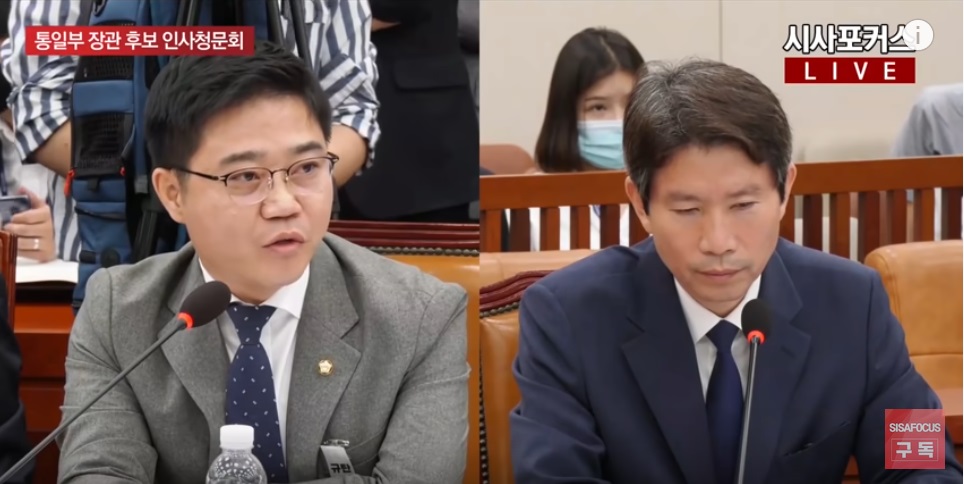
Here are samples of 1000s of Netizens’ comments (had consistent themes) when Ji asked Lee questions:
“If you (Lee) like the North Korean regime that much…go live in North Korea. Don’t spy in South Korea. The system is different. Go live in a system you like. You cannot change our system here.”
“Defectors Thae Yong-ho and Ji Seong-ho, who dreamed of liberal democracy and know how important it is, are doing really well, like a real opposition party.
“Get rid of the Ministry of Unification and the Ministry of Gender Equality. They’re wastes of taxes.”
“The defectors, who are first time lawmakers, are better than 100 opposition party lawmakers.”
“He said he didn’t know yet. It’s incredulous. He’s not interested in our citizens detained in North Korea.”
“Assemblyman Ji Seong-ho. It’s so sad that our citizens are detained in North Korea. I’m rooting for you.”
“The Unification Minister nominee who says “south side,” “south side,” “south side,” instead of our country or the Republic of Korea–is he really the Unification Minister nominee? I’m so angry.”
“Moon Jae-in will appoint Lee In-young anyway. Lee will quickly become the worst Unification Minister.”
National Assemblyman Park Jin (박진), United Future Party, asks nominee Lee In-young about the ROK-U.S. alliance, President Syngman Rhee
(0:55) Park: In the nominee Lee In-young’s case, you have been questioned whether you’re ideologically biased based on your fighting, revolution (revolutionary goals), and comments in your student days. I hope that is a misunderstanding. Please show the slides. According to the materials by the Democracy Movement Memorial Project (민주화운동기념사업회), there is a 21-page document ‘Forward Together with Comrade, Struggle Together with Comrade’ (동지와전진 동지와투쟁). It shows the author of this document as Lee In-young and…
(1:29) Lee: (Interrupts) That is…
(1:30) Park: The topic is…
(1:31) Lee: Excuse me…
(1:32) Park: I’ll finish. It is recorded that ‘the chairman of Jeondaehyup revealed his position on the goal and strategy of the election struggle for the Korean Minjok Liberation (National Liberation) movement.’ Is it correct that Mr. nominee wrote this at that time?
(1:47) Lee: It’s incorrect…even the part you circled does not say “a document written by Lee In-young,” but is overlapped with hearsay “it is said (it is written by Lee In-young).”
(1:59) Park: It clearly states the author is Lee In-young. If you look next to it, it shows,
“It is said the document is written by Jeondaehyup Seodaehyup Chairman Lee In-young, mid-September.”
(2:11) Lee: Isn’t it “It is said?”
(2:13) Park: (holding up the document) Are you saying the Democracy Movement Memorial Project recorded this document incorrectly? [Note: As of August 1, 2020, the document is no longer on the website, https://www.kdemo.or.kr/book/photo/page/1 ]
(2:20) Lee: Based on my memory, it is incorrectly remembered. It appears incorrectly recorded.
(2:25) Park: So it’s incorrectly recorded? You didn’t write this?
(2:26) Lee: I remember it as something I didn’t write.
(2:28) Park: Do you know the content of the document?
(2:30) Lee: The content of the document…uh…
(2:33) Park: You know, don’t you?
(2:34) Lee: Yes, I remember…recently I remember.
(2:35) Park: In this document (Park reads the document) “we can never lower the flag of self minjok (nation or ethnic Koreans) unification. Yankee invaders, an occupation force that has established a base south of the 38th Parallel, set up Syngman Rhee as a puppet regime in the south and tore the flag of the minjok (national) liberation struggle into tatters. The main agent of the revolution is the power of the 3-in-1 body of Suryong (Leader of North Korea; Kim Il-sung)-Party-Masses.” Do you agree with such thoughts?
(2:59) Lee: It could be the content that I may have read, but “I agree with this thought”–I can’t say such (sentence).
(3:04) Park: Suryong-Party-Masses…
(3:05) Lee: (interrupting) Aren’t there considerable parts that I can’t agree with?
(3:08) Park: In ‘the 3-in-1 body of Suryong-Party-Masses,’ who are Suryong and the Party?
(3:13) Lee: I don’t think it’s an issue that I need to give a direct answer. “This is…something…a content that I agree with”–I can’t think that way. I don’t agree with “the 3-in-1 body of ‘Suryong-Party-Masses’ system.”
(3:30) Park: I think they are referring to Suryong Kim Il-sung and Korea Workers’ Party (North Korea’s communist party). Among the activists and progressives, the term “jaju” (self) means anti-U.S., doesn’t it?
(3:40) Lee: It’s not identical.
(3:41) Park: The words “Jaju and Anti-U.S. struggle” are used a lot. Did the U.S. impose the Republic of Korea (ROK)-U.S. alliance? Or did we choose it?
(3:50) Lee: Whether it’s imposed or chosen, there is a strong foundation of value alliance of democracy and market between Korea and the U.S. From that perspective, to say ‘one imposed on another’ is not an assessment I can make.
(4:06) Park: As the open hostilities drew to a close during the Korean War, President Syngman Rhee requested it from President Eisenhower, wasn’t it? “To get an Armistice, let’s be allies.” Is the U.S. forces in Korea an occupation force (jeomryong-goon 점령군)?
(4:18) Lee: I see that the U.S forces in Korea has…the…the characteristics of a peace management force and next, in the situation in which the war is not completely ended, during the Armistice, it also has the characteristics of a stationed force (judoon-goon 주둔군; the dictionary also shows ‘occupation force’) at the same time. “As for the characteristics of an occupation force (jeomryong-goon), it could be an assertion of a part of the population, but it is not a universally established assertion” is what I want to say.
(4:41) Park: Is the Syngman Rhee administration a puppet regime?
(4:43) Lee: Rather than the puppet regime controversy of the Syngman Rhee administration, the Syngman Rhee administration itself…there are a lot of criticisms of a constant meaning of having characteristics of a dictator regime and also during the independence movement era, President Syngman Rhee…some kind of compromise or uncompromising or in the middle…from these perspectives, what kind of policy line he sets, related to these…
(5:11) Park: (interrupting) A puppet regime or not?
(5:11) Lee: (pause) I think the assessments can differ.
(5:13) Park: A puppet regime or not?
(5:16) Lee: I can’t conclusively say whether the Syngman Rhee administration is a puppet regime or not, but…
(5:21) Park: (interrupting) I got it. Too difficult to answer?
(5:22) Lee: (talking over) If I must do it like you say, “regarding concluding it is a puppet regime, there remain various different views” is what I say.
(5:29) Park: The ROK-U.S. alliance is not something the U.S. imposed on us, but the alliance is something we chose based on our sovereign right. The U.S. forces in Korea are based in South Korea per the Mutual Defense Treaty and with our permission. The U.S. forces in Korea are not an occupation force, but (part of) combined forces we stand shoulder-to-shoulder for freedom.
(5:51) Park: The Syngman Rhee government is not a puppet regime, but a legal government that the UN recognized as the sole legal government on the Korean Peninsula. President Syngman Rhee is not just a simple “Dr. Syngman Rhee,” but is the first president and the founding father of the Republic of Korea. Do you agree?
[Note: There was a controversy on President Syngman Rhee’s death anniversary (July 25, 2020), when the Minister of Patriots and Veterans Affairs did not address him as “President Syngman Rhee,” but as “Dr. Syngman Rhee” repeatedly in speeches and other materials.]
(6:05) Lee: Since the citizens elected through the election to establish the government, from that true nature of truth, I have a different opinion regarding the stipulation of a puppet government, but on the other hand, “President Syngman Rhee is our founding father”–this kind of assertion, honestly, I think a bit differently.
(6:30) Park: So much difficulty…
(6:30) Lee: “Our founding father should be Premier Kim Ku…it is more appropriate” is what I think, and…
(6:33) Park: So much difficulty…
(6:34) Lee: I have that kind of historical consciousness.
(6:35) Park: You explain it with so much difficulty.
(6:37) Park: Mr. nominee. Are you familiar with the contents of the book by the former U.S. National Security Adviser Bolton?
(6:42) Lee: I haven’t read all of it, but recently I saw excerpts.
(6:47) Park: The Moon administration-led bungled diplomatic initiative shook the foundation of the ROK-US alliance, broke down inter Korea relations, and made the denuclearization (of North Korea) more difficult. Ultimately, we became an outcast, marginalized by the U.S. and North Korea…(the microphone was turned off at this point; he asked for 30 seconds, but didn’t get it; he continued to talk).
(7:34) Lee: “The ROK-US mutual assistance, ROK-US alliance is stronger than ever” is what I think. “it is getting deeper in a variety of fields, and getting wider” is how I see it. Regarding the process of resolving the nuclear issue, recently President Moon Jae-in’s solution, more than anytime, peaceful and through dialogue, while not taking the North Korea-U.S. relations to the point of conclusion, moved forward swiftly to resolve the North Korea nuclear issue.–We should watch well such aspects of outcome simultaneously. From that aspect, ‘it would be good to strengthen and expand even more the theory of Driver of the Korean Peninsula and the peace process of the Korean Peninsula’ is what I think.
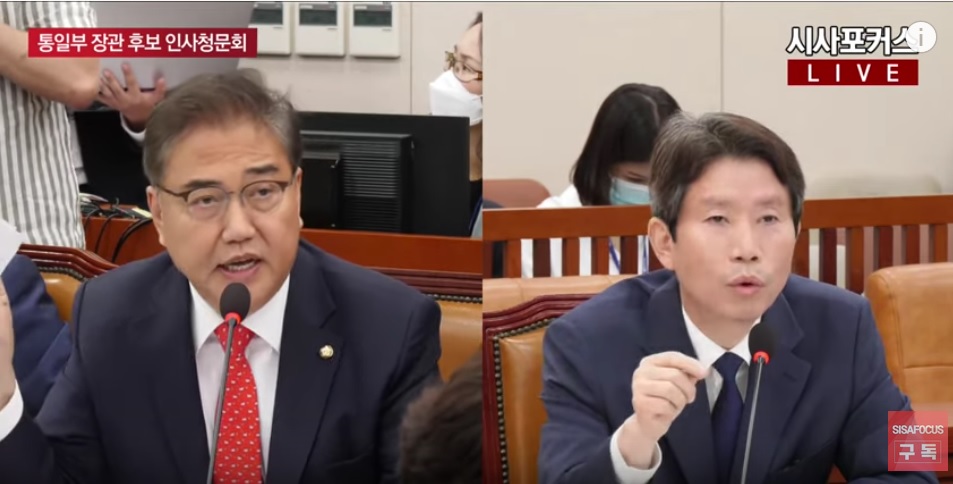
Netizens’ comments, which have consistent theme, in this video of the hearing:
“Lee In-young, this person is a communist. I sensed it numerous times. It’s clear he has communist ideology. How can someone who should go live in North Korea be nominated as the Unification Minister? This country is doomed. I’m Assemblyman Park Jin’s fan.”
“Lee In-young. He is not honest and not just. Moon Jae-in trouble maker groups are not transparent. They only have darkness. “
“How did free Republic of Korea let communism believers lead the country? The citizens essentially gave their votes to a communist party.”
“[So much] is confirmed by the nominee’s statement. It’s confirmed now about so many people saying the country is controlled by the leftists. I’m so worried. I want to cry. Lee In-young, who directly echos North Korean spokesperson’s statements, must not become the Unification Minister. Please stop him.”
“How can someone with that ideology be in the Blue House and the National Assembly of the Republic of Korea. I’m so angry.”
“He can’t acknowledge President Syngman Rhee. He says Kim Ku is the founding father. How can this crazy person become the Unification Minister. He says the ROK-U.S. alliance is better than ever. What will happen to this country?”
How can Jusapa Lee In-young be nominated as the Unification Minister? How much more will they ruin (the country)? If you like being Jusapa, you can all just leave the Republic of Korea. To North Korea. All of you go. We won’t block you. Quietly. You’ll be more comfortable…will see hope…please go. Don’t make people suffer and be anxious…”
“2:27: ‘I remember it as something I didn’t write.’ The way he uses words is strange. If I did it, I did it, and if not, it’s not, but “I remember it as something I didn’t do.” Is this a normal expression?”
“The Jusapa in the Republic of Korea are Kim Jong-un’s underlings. Why do they send their kids to study in the U.S., rather than to Kim Il-sung University? I think it’s more appropriate for them to send their offspring to North Korea to study.”
Moon Jae-in appoints Lee In-young as the Minister of Unification
On July 27, 2020, President Moon appointed Lee In-young as the Minister of Unification after the ruling Democratic Party, without including the main opposition party, voted on the resolution on the nomination hearing and submitted it to the Blue House. Lee went to work without holding the traditional inauguration ceremony.
Lee continued his cryptic statements when he visited the National Cemetery in Seoul on July 30, 2020: “I think even when the bombs drop all around you during a war, only those who yell out ‘peace’ are more just and more fair.” Lee also indicated more proactive measures toward North Korea, when he ordered the ministry staff, “We need to break away from passive and supportive attitudes and switch to a vigorously motivated drive and proactive attitude.”
